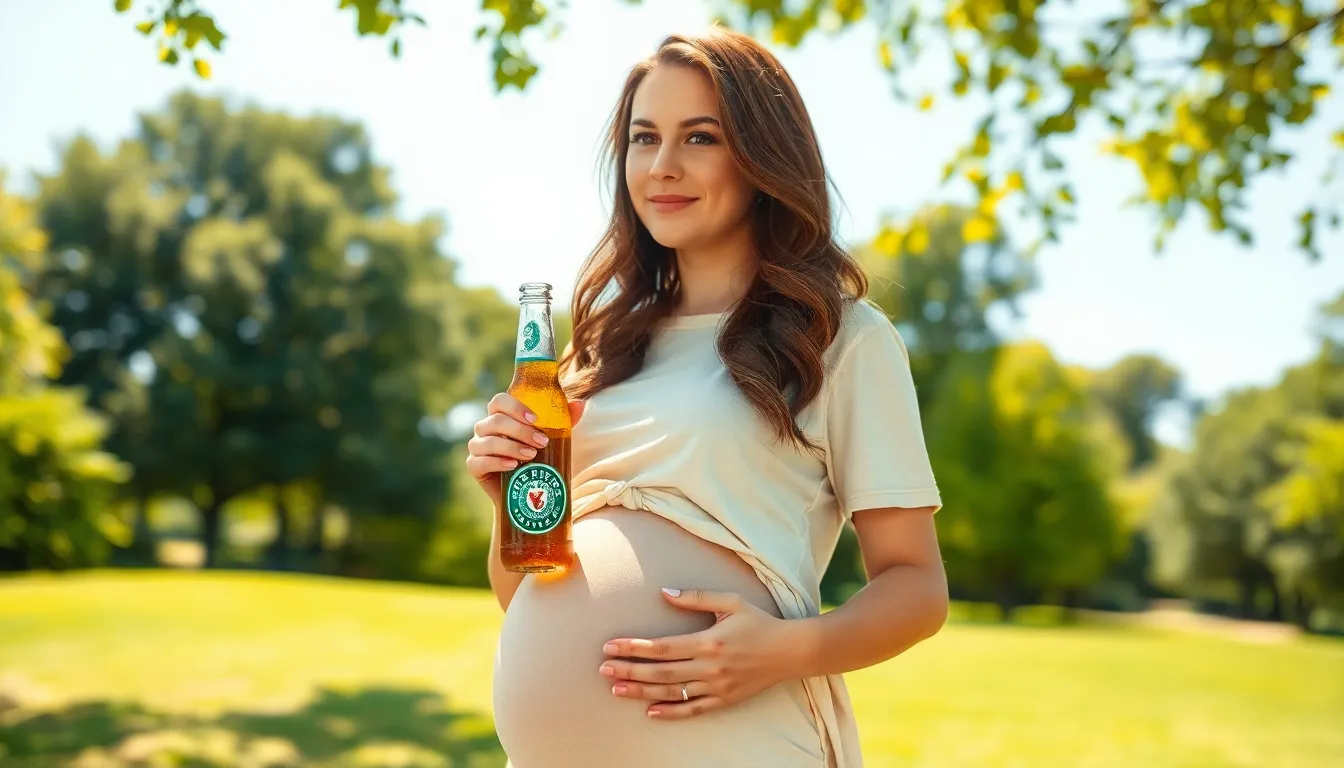Pregnancy brings a whirlwind of changes, cravings, and a whole lot of advice, often leaving soon-to-be moms wondering what’s safe and what’s not. One question that bubbles up is whether non-alcoholic beer is a safe choice during this exciting journey. After all, who wouldn’t want to sip on something that resembles their favorite brew while navigating the world of baby showers and diaper changes?
Table of Contents
ToggleUnderstanding Non-Alcoholic Beer
Non-alcoholic beer contains minimal alcohol, typically less than 0.5% alcohol by volume. This low level is significantly lower than traditional beer, which often contains 4-6% alcohol. Most brands use similar brewing methods as regular beer, producing an authentic taste while eliminating much of the alcohol content.
Studies show that moderate consumption of non-alcoholic beer is safe for most adults, but its effects on pregnant women remain less studied. Experts emphasize caution when it comes to any alcohol consumption during pregnancy. The developing fetus may react differently to even trace amounts of alcohol, leading to potential risks.
Some components of non-alcoholic beer offer health benefits. Ingredients like barley, hops, and various nutrients can contribute to hydration and provide certain vitamins. However, not all non-alcoholic beers are created equal. Many commercial brands may add sugars or artificial flavors, which can be less healthy options.
Expectant mothers curious about trying non-alcoholic beer should consult healthcare providers. Individual circumstances may impact advice regarding any beverage consumption during pregnancy. Additionally, considering personal comfort and making informed choices plays a crucial role in the decision-making process.
Awareness of ingredients and nutritional values further supports consumers in selecting healthier beverages. Opting for brands known for quality can enhance safety and enjoyment. Monitoring personal responses to different products may also help inform future choices.
Health Implications of Alcohol During Pregnancy

Alcohol consumption during pregnancy poses significant risks. Evidence suggests that any level of alcohol intake can affect fetal development. Experts recommend complete avoidance of alcohol to ensure the safety and health of both mother and child.
Risks of Alcohol Consumption
Alcohol consumption leads to various complications during pregnancy. Research indicates that even small amounts can result in lower birth weights. Some studies link alcohol to developmental disorders such as fetal alcohol spectrum disorders (FASDs). Healthcare professionals urge pregnant women to eliminate alcohol from their diets. The potential for adverse outcomes exists with any alcohol exposure.
Effects on Fetal Development
Alcohol negatively impacts fetal development at various stages. It affects brain formation and can hinder cognitive functioning. Growth restrictions and physical defects may also arise from prenatal exposure to alcohol. Behavioral problems in children further underline the risks associated with drinking during pregnancy. Women considering any alcohol consumption should consult healthcare providers to discuss these dangers.
Is Non-Alcoholic Beer Safe During Pregnancy?
Non-alcoholic beer raises questions for expectant mothers. Many women want to know if enjoying this beverage poses risks during pregnancy.
Ingredients in Non-Alcoholic Beer
Ingredients in non-alcoholic beer vary by brand. Barley, hops, and yeast are common, providing potential health benefits. It’s crucial to check labels for added sugars and artificial flavors, as some brands are higher in calories and lower in nutritional value. Pregnant individuals should prioritize products with natural ingredients and fewer additives. Consulting healthcare providers about ingredient choices ensures informed decisions.
Alcohol Content and Regulations
Alcohol content in non-alcoholic beer typically remains below 0.5% by volume. Regulations in many countries require this limit, making it significantly lower than standard beer. Despite the low alcohol level, experts recommend caution, as there’s no established safe threshold for alcohol consumption during pregnancy. Even trace amounts can potentially affect fetal development. Expectant mothers should err on the side of caution and discuss any beverage choices with their healthcare providers to ensure safety.
Expert Opinions and Recommendations
Experts advocate for caution when considering non-alcoholic beer during pregnancy. Though it contains less than 0.5% alcohol by volume, any alcohol intake raises concerns due to its potential impact on fetal development. Healthcare providers universally recommend complete avoidance of alcohol in all forms during this critical period.
Medical studies highlight the risks associated with any level of alcohol consumption. These risks can include complications like lower birth weights and disorders related to fetal alcohol spectrum disorders (FASDs). Acknowledging these potential issues, medical professionals suggest expectant mothers prioritize safe beverage choices.
Consulting a healthcare provider becomes essential before making decisions regarding non-alcoholic beer or any beverage containing trace amounts of alcohol. Each pregnancy is unique, and healthcare providers can offer personalized guidance based on individual circumstances.
While some ingredients in non-alcoholic beer, such as barley and hops, may provide health benefits, product quality varies significantly among brands. Many brands contain added sugars or artificial flavors, which may not align with health-conscious objectives during pregnancy. Therefore, choosing products with natural ingredients and fewer additives remains crucial for maintaining overall health.
Expectant mothers should remain informed about potential impacts on their babies. Fetal brains undergo significant development during pregnancy, making any risk associated with alcohol intake particularly concerning. Heightened awareness of ingredient quality assists in making safe choices. Engaging in open discussions with healthcare professionals will lead to well-informed decisions regarding beverage selections throughout pregnancy.
Navigating pregnancy involves making informed choices about diet and lifestyle. While non-alcoholic beer may seem like a tempting alternative for those missing the taste of traditional beer, the potential risks associated with any alcohol intake cannot be overlooked. Given the importance of prioritizing fetal health, expectant mothers should approach this beverage with caution.
Consulting healthcare providers is essential for personalized advice tailored to individual circumstances. By focusing on natural ingredients and minimizing additives, mothers can make safer choices. Ultimately, the safest route remains the complete avoidance of alcohol in all forms during pregnancy to ensure the well-being of both mother and child.





